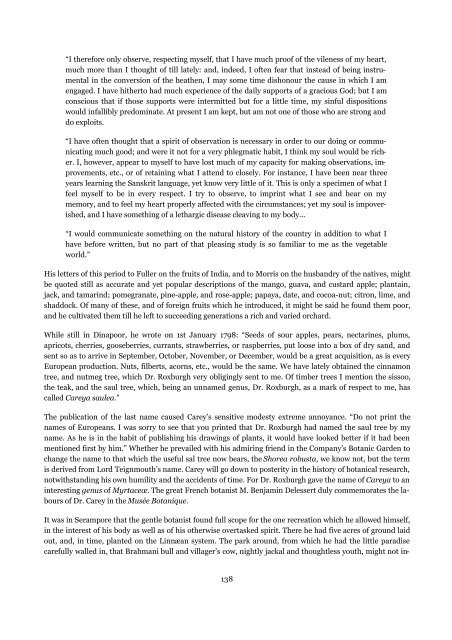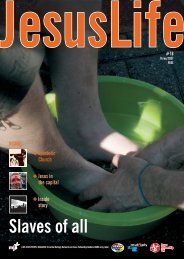Life of William Carey by George Smith - The Jesus Army
Life of William Carey by George Smith - The Jesus Army
Life of William Carey by George Smith - The Jesus Army
Create successful ePaper yourself
Turn your PDF publications into a flip-book with our unique Google optimized e-Paper software.
“I therefore only observe, respecting myself, that I have much pro<strong>of</strong> <strong>of</strong> the vileness <strong>of</strong> my heart,<br />
much more than I thought <strong>of</strong> till lately: and, indeed, I <strong>of</strong>ten fear that instead <strong>of</strong> being instrumental<br />
in the conversion <strong>of</strong> the heathen, I may some time dishonour the cause in which I am<br />
engaged. I have hitherto had much experience <strong>of</strong> the daily supports <strong>of</strong> a gracious God; but I am<br />
conscious that if those supports were intermitted but for a little time, my sinful dispositions<br />
would infallibly predominate. At present I am kept, but am not one <strong>of</strong> those who are strong and<br />
do exploits.<br />
“I have <strong>of</strong>ten thought that a spirit <strong>of</strong> observation is necessary in order to our doing or communicating<br />
much good; and were it not for a very phlegmatic habit, I think my soul would be richer.<br />
I, however, appear to myself to have lost much <strong>of</strong> my capacity for making observations, improvements,<br />
etc., or <strong>of</strong> retaining what I attend to closely. For instance, I have been near three<br />
years learning the Sanskrit language, yet know very little <strong>of</strong> it. This is only a specimen <strong>of</strong> what I<br />
feel myself to be in every respect. I try to observe, to imprint what I see and hear on my<br />
memory, and to feel my heart properly affected with the circumstances; yet my soul is impoverished,<br />
and I have something <strong>of</strong> a lethargic disease cleaving to my body...<br />
“I would communicate something on the natural history <strong>of</strong> the country in addition to what I<br />
have before written, but no part <strong>of</strong> that pleasing study is so familiar to me as the vegetable<br />
world.”<br />
His letters <strong>of</strong> this period to Fuller on the fruits <strong>of</strong> India, and to Morris on the husbandry <strong>of</strong> the natives, might<br />
be quoted still as accurate and yet popular descriptions <strong>of</strong> the mango, guava, and custard apple; plantain,<br />
jack, and tamarind; pomegranate, pine-apple, and rose-apple; papaya, date, and cocoa-nut; citron, lime, and<br />
shaddock. Of many <strong>of</strong> these, and <strong>of</strong> foreign fruits which he introduced, it might be said he found them poor,<br />
and he cultivated them till he left to succeeding generations a rich and varied orchard.<br />
While still in Dinapoor, he wrote on 1st January 1798: “Seeds <strong>of</strong> sour apples, pears, nectarines, plums,<br />
apricots, cherries, gooseberries, currants, strawberries, or raspberries, put loose into a box <strong>of</strong> dry sand, and<br />
sent so as to arrive in September, October, November, or December, would be a great acquisition, as is every<br />
European production. Nuts, filberts, acorns, etc., would be the same. We have lately obtained the cinnamon<br />
tree, and nutmeg tree, which Dr. Roxburgh very obligingly sent to me. Of timber trees I mention the sissoo,<br />
the teak, and the saul tree, which, being an unnamed genus, Dr. Roxburgh, as a mark <strong>of</strong> respect to me, has<br />
called <strong>Carey</strong>a saulea.”<br />
<strong>The</strong> publication <strong>of</strong> the last name caused <strong>Carey</strong>’s sensitive modesty extreme annoyance. “Do not print the<br />
names <strong>of</strong> Europeans. I was sorry to see that you printed that Dr. Roxburgh had named the saul tree <strong>by</strong> my<br />
name. As he is in the habit <strong>of</strong> publishing his drawings <strong>of</strong> plants, it would have looked better if it had been<br />
mentioned first <strong>by</strong> him.” Whether he prevailed with his admiring friend in the Company’s Botanic Garden to<br />
change the name to that which the useful sal tree now bears, the Shorea robusta, we know not, but the term<br />
is derived from Lord Teignmouth’s name. <strong>Carey</strong> will go down to posterity in the history <strong>of</strong> botanical research,<br />
notwithstanding his own humility and the accidents <strong>of</strong> time. For Dr. Roxburgh gave the name <strong>of</strong> <strong>Carey</strong>a to an<br />
interesting genus <strong>of</strong> Myrtaceœ. <strong>The</strong> great French botanist M. Benjamin Delessert duly commemorates the labours<br />
<strong>of</strong> Dr. <strong>Carey</strong> in the Musée Botanique.<br />
It was in Serampore that the gentle botanist found full scope for the one recreation which he allowed himself,<br />
in the interest <strong>of</strong> his body as well as <strong>of</strong> his otherwise overtasked spirit. <strong>The</strong>re he had five acres <strong>of</strong> ground laid<br />
out, and, in time, planted on the Linnæan system. <strong>The</strong> park around, from which he had the little paradise<br />
carefully walled in, that Brahmani bull and villager’s cow, nightly jackal and thoughtless youth, might not in-<br />
138
















